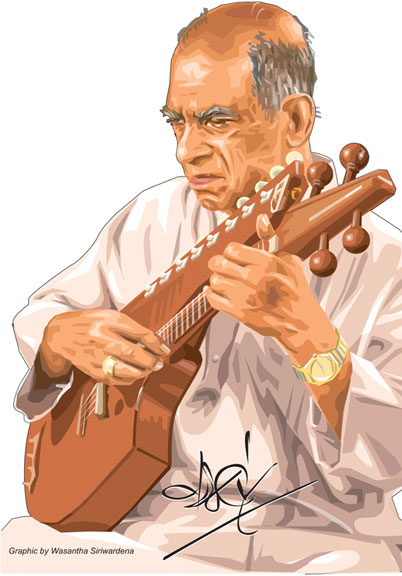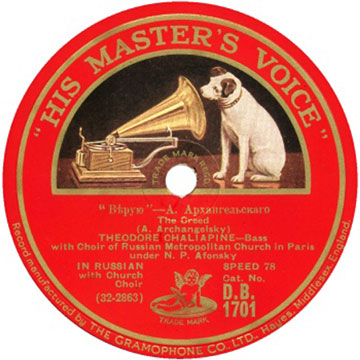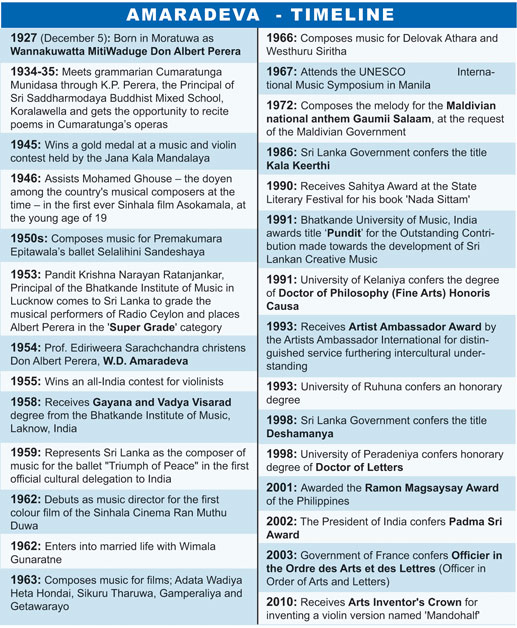|
Amaradeva, now 88, began with Baila:
The Master’s Voice

A pioneer who gave identity to the Sinhala classical song,
legendary composer and vocalist Pandit W. D. Amaradeva will
celebrate his 88th birthday by offering his millions of fans,
multiple treats of the musical kind.
‘Sasara Wasana Thuru - Amara Gee Rasoghaya,’ is an exclusive
collection of songs by maestro Amaradeva is scheduled for release on
December 5 at the BMICH. A series of classical music workshops on
tabla and sitar will follow on December 6 –7, conducted by eminent
music gurus from India at the Indian Cultural Centre, Colombo, free
of charge. A classical resonance concert titled ‘Sangeetha Sadhana,’
featuring two world acclaimed India artistes Pandit Anindo
Chatterjee and Purbayan Chatterjee, will perform together with Sri
Lankan artistes Ravibandu Vidyapathy, Upul Madhushanka, Aruna
Siriwardane and Rakhita Wickramaratne on December 8 at the BMICH.
In his twilight years now, the maestro who had an unparalleled
trailblazing career in music for decades, still remains
unchallenged. He had mastery over his own voice, golden and unique
and representative of the people of his land. Besides his unique
talent was also his contribution over the years to the development
of the Sinhala song.
It is only natural that a grateful nation would wish to pay
tribute to Sri Lanka’s ‘voice supreme.’
This unique music festival is designed to celebrate the
quintessential spirit of the maestro by the Amaradeva Foundation, an
organization established for the archiving and preservation of
Amaradeva’s work. Ahead of “Sasara Wasana Thuru – Amara Gee
Rasoghaya,” the Sunday Observer met Amaradeva to discuss his
legendary music career as well as his future plans.
by Anuradha Kodagoda
The name is still magic. So is the voice. With dozens of accolades
and encomiums showered on him in the past several decades, maestro
Amaradeva continues to secure his place as Sri Lanka’s leading composer
and vocalist as well as for the richness and depth of his understanding
of music. It is magical how deftly he had applied his vast knowledge to
produce a vast corpus of semi-classical light music that remains
outstandingly popular, even today.
 Apart
from bagging the ‘Most Popular Artiste’ award at the SLIM Awards,
continuously for the past one decade, Amaradeva’s career was studded
with the kind of recognition others can only dream of. Winner of the
prestigious Ramon Magsaysay Award (2001), Amaradeva is also the winner
of the coveted Padma Sri Award (2002) conferred by the Indian Government
for artistic finesse, ‘Kala Keerthi’ (1986) and ‘Deshamanya’ (1998) by
Sri Lanka as well as the Chevalier title conferred by the French
Government (2003) - just to name a few. . Apart
from bagging the ‘Most Popular Artiste’ award at the SLIM Awards,
continuously for the past one decade, Amaradeva’s career was studded
with the kind of recognition others can only dream of. Winner of the
prestigious Ramon Magsaysay Award (2001), Amaradeva is also the winner
of the coveted Padma Sri Award (2002) conferred by the Indian Government
for artistic finesse, ‘Kala Keerthi’ (1986) and ‘Deshamanya’ (1998) by
Sri Lanka as well as the Chevalier title conferred by the French
Government (2003) - just to name a few. .
Born as the youngest of seven children to a carpenter, Wannakuwatta
Waduge Don Ginoris Perera, and Balapuwaduge Maggie Weslina Mendis in
Koralawella, Moratuwa, on 5 December 1927, Amaradeva’s original name was
Wannakuwatta Waduge Don Albert Perera. His father was a Buddhist while
his mother was a Methodist, bringing into his young life both the
Buddhist and Christian values as well as music traditions.
Love for music
“I loved music as a child and I will always. My father gifted me a
violin for my seventh birthday and I still remember how I used to strum
it as my mother sang hymns. My elder brother was another influence in my
early career as he taught me the basics of Indian classical music when I
was very small. When we were kids, my father used to take us to watch
Hindi movies and I used to bring my violin along and play it at the
cinema. It was fun,” he said, reminiscing.
He obtained his early education under Ven. Malalankara Nayaka’s
instructions at the Koralawella temple. As his talent slowly grew, he
was invited to recite poems, conduct prayers at the temple and was also
chosen often to lead the village choir.
While he studied at Sri Saddharmodaya, a Buddhist mixed school, the
young lad won a poetry contest which prompted his school teachers to get
him to showcase his talent by reciting, this time on Radio Ceylon.
Young Albert Perera was fortunate enough to be associated with many
eminent scholars and artistes whose contribution towards cultural
renaissance in the island served as an early influence in his life. As a
schoolboy, he had the privilege of meeting Munidasa Kumarathunga who
left an indelible mark on his musical career. His popular ‘Handapane
Welithala’ song was based on a poem by Kumarathunga. In subsequent
years, many songs were penned by the Sinhala scholar, exclusively for
the young artiste.
 Meeting
Sunil Santha was a huge turning point in his life. “I met him at a music
concert and he was quite famous at that time. Sunil Santha invited me to
face an audition at Chitrasena Studios and there, I played in front of
Sunil Santha, Chitrasena and A. J. Ranasinghe. They were quite impressed
by my performance. Thereafter we became good friends and Chitrasena’s
Studio in Kollupitiya which later became our common meeting place; a
sort of a cultural ashram,” he said. Meeting
Sunil Santha was a huge turning point in his life. “I met him at a music
concert and he was quite famous at that time. Sunil Santha invited me to
face an audition at Chitrasena Studios and there, I played in front of
Sunil Santha, Chitrasena and A. J. Ranasinghe. They were quite impressed
by my performance. Thereafter we became good friends and Chitrasena’s
Studio in Kollupitiya which later became our common meeting place; a
sort of a cultural ashram,” he said.
Influences
His hometown, Moratuwa, itself was one of the greatest influences on
him. Moratuwa was a town heavily influenced both by Catholicism and a
cosmopolitan lifestyle. It remains to date the most popular seat of
baila in Sri Lanka and has produced many popular musicians and
vocalists.
“In my early days, I have really moved with the genre of baila and I
really liked the style. I have composed music for the songs ‘Pipi Pipi
Renu Natana’ and ‘Ran Dahadiya Bindu Bindu’ with a strong baila streak,”
he notes.
Earning himself a position at the Bhatkhande Music Institute in
Lucknow was the first proper break. There, he studied the North Indian
classical music and also exhibited his unique vision and talent to an
audience wider than he had ever imagined.
“The scholarship fund was initiated by D.B Dhanapala and Prof.
Ediriweera Sarachchandra in the 1950s which gave me the end of a golden
strong. I remain forever grateful for the people of this country because
they raised the fund for me and gave me the opportunity to become what I
am today. The Institute was such a huge influence. This is also why,
through the Amaradeva Foundation, I intend sharing my knowledge with the
next generation and strive to create opportunities for them to study
music in its true and pure form,” stresses maestro Amaradeva.
Musical identity
He returned to the island to experience a new political resurgence in
the country. The island was beginning to emerge as an independent
nation, and one of the dilemmas was naturally about the cultural
identities. Naturally, there were questions about exactly what the Sri
Lankan musical identity was, and if nonexistent, what is should ideally
be.
The young musician, armed with his newfound knowledge, began a new
experiment: combining the indigenous folk music with the North Indian
ragas, thus creating a more sophisticated cadence. The artiste in him
was reborn with a special baptism by Prof. Edirweera Sarachchandra, and
W. D. Albert Perera became Amaradeva, a name that brought him global
fame.
“It was an era when South Indian film music was extremely popular.
Most of the Sinhala songs were created using Hindi melodies as their
base. We hardly had an identity in music and the erosion was so strong.
Some have claimed that my genre of music was a revolutionary
counterattack for the music culture that existed at the time. I don’t
agree with that completely. It was a necessity. It was necessary for our
journey in seeking a Sri Lankan identity in music,” he said.
Apart from his hundreds of golden solos, maestro Amaradeva has
composed music for ballets (Karadiya and Nala Damayanthi), films (Ran
Muthu Duwa, Gam Peraliya, Ransalu, Delovak Athara, Gatavarayo, Rena
Girav, Thunman Handiya and more), theatre (Pabawathi, Elowagihin Melowa
Awa, Lomahansa, Wessanthara) and others. In all that, there was the
unique Amaraveda mark.
Credited as having introduced artistes such as Nanda Malini and
Edward Jayakody to the music industry, many artistes such as Sunil
Edirisinghe, Victor Ratnayake and Neela Wickramasinghe have considered
Amaradeva a major influence on their work.
Also described as a musician who defined modern Sri Lankan
civilization for his unique role in the creation of a post-colonial
national tradition, his work came to reflect the spirit of the nation,
earning him the unique title: father of the contemporary Sinhala music. |

